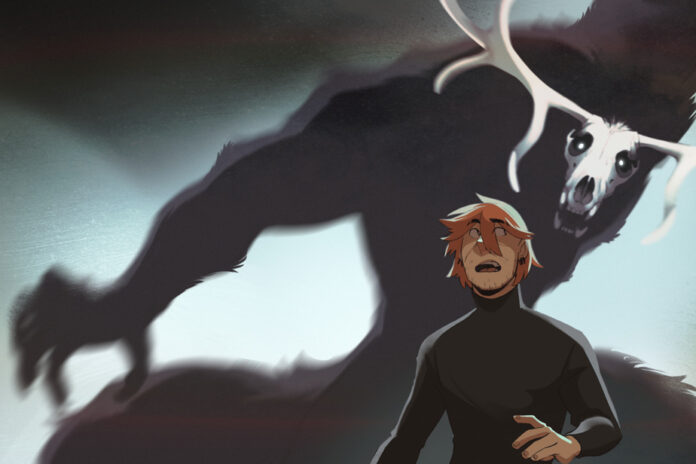It is not without pleasure that we find the city of Montreal in Distress, serving as a setting for this investigative story. We find Lenny, a young Frenchman arriving in the metropolis to study journalism, following rumors according to which a nocturnal monster is rampant. He joins forces with his comrade Anoki, an Algonquin who is not very keen on lifting the veil on this affair. During their hunt, mysteries remain: could it be a wendigo? How did Lenny lose his leg? Why is Anoki reluctant? The graphic style of this first volume is attractive, served by 100% color printing. The story is slightly sluggish, but the action set in Montreal, something rare in manga, gives it a certain appeal. Small drawback, similar to that criticized for Jean-Paul Dubois’ books set in Quebec: the local characters speak, at best, in “neutral” French, at worst, in “de France” French; on 250 pages, we counted two Quebecisms. Color enhances the design; local color would enhance the dialogues.
He makes the thugs and tough guys in the bad neighborhood of Shimokita tremble. So who is this mysterious “Yankee hunter”, who smashes small local strikes with devastating punches? Just like the cheekbones, the rumor swells: this vindicator would be a puny young boy with a fearful appearance, but perfectly hiding his (footwork). So much so that he himself doesn’t know where these boxing techniques come from, which he actually only uses to defend himself. His only goal is “to find his place in this world”. What does this mean? The protagonist himself seems caught in a spiral of existential and social torment. A psychological spotlight that allows us to go beyond the simple “fighting galore” aspect. In the same vein, we can also look at the case of Demons Star (Kazoku editions), where a student finds himself immersed in a school jungle where the law of the strongest reigns.
Here, Takeshi Obata is in charge of the pencils, having already signed cult series like Death Note or Bakuman. As for the screenplay, it is directed by rising star Akinari Asakura. The theme of Show-ha Shoten is inspiring, even if it can be misleading, featuring (or rather, on stage) a duo of comedians looking to make a name for themselves. One is an embarrassed genius, with relentless jokes, but losing his temper in front of the public; the other is a charismatic improviser, but not always inspired. Knowing that humorous traits are particularly difficult to translate, both for linguistic and cultural reasons, it is not surprising to remain a little perplexed by the performances of the duo put through the French mill. One thing is certain, they won’t make you laugh. But the interest of the manga lies more behind the scenes, where the complicity between the protagonists and the dissection of the pranks are laid bare. A good start, we just hope not to fall into a repetitive spiral like Bakuman.
For fans of the fantasy genre, the Level 999 manga models the mechanisms of an RPG (role playing game) by presenting characters with a level of experience, divided into several classes. In principle, simple villagers cannot exceed level 30. So who is this person who slays monsters and demons while displaying the impossible mark 999? This is where the adventure begins, led by this brave man obsessed with tempting dishes. Dynamism and surprising intrigue, despite the archiclassical workings proposed. Another proposition in the same style, but bloodier, Tengu Hunters Brothers (published by Kazoku) features a demon hunter in a world where the latter operate in the shadows. But the hero, heir to a family of guards, will have the unpleasant surprise of leaning, despite himself, on the bad side…















